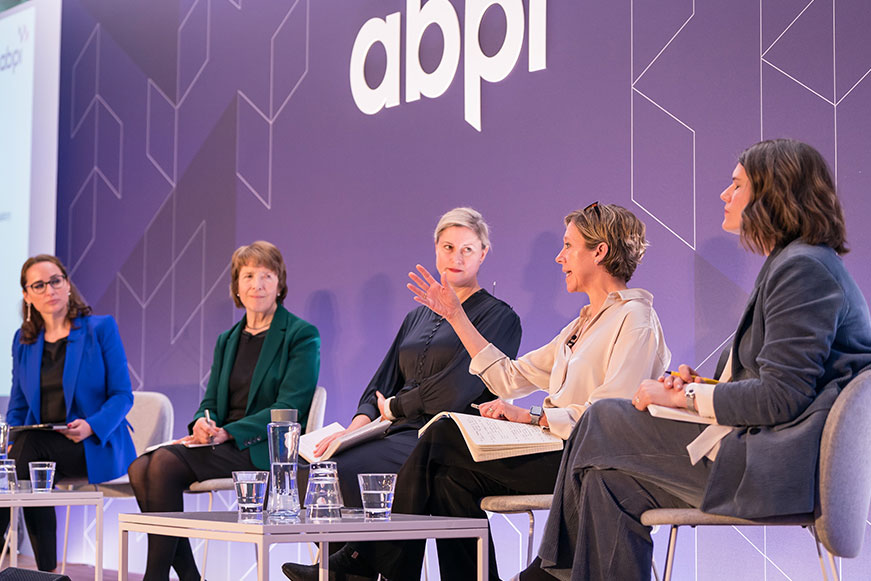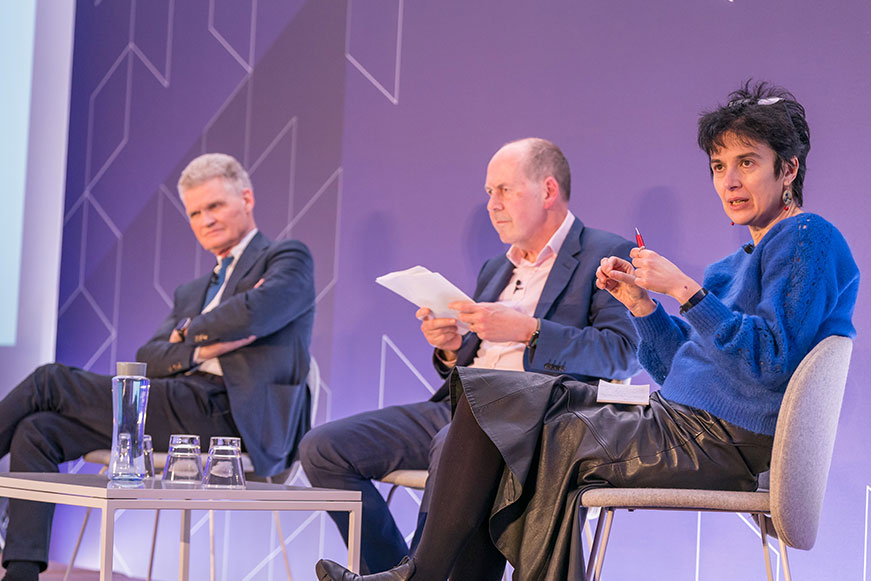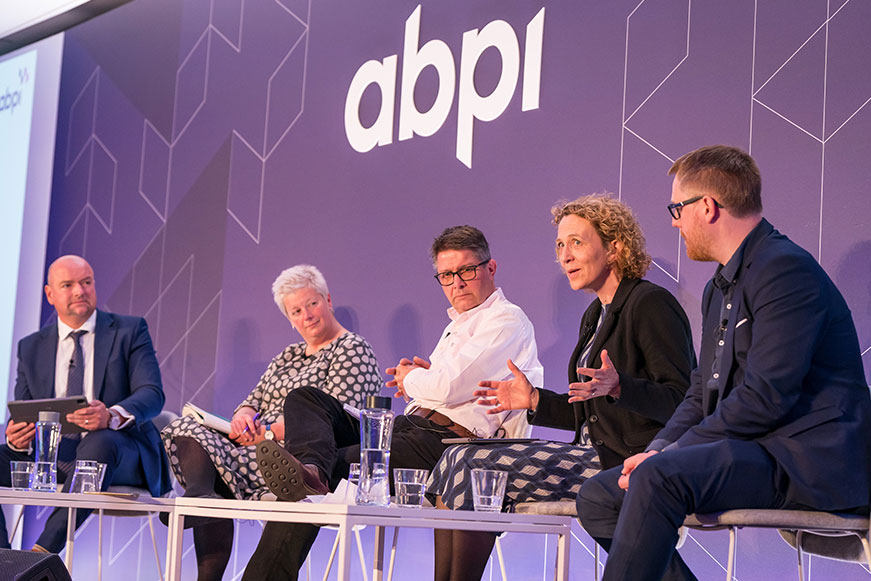Panel sessions

Implementing the O’Shaughnessy Review: trials, tribulations and triumphs
Lucy Chappell, Ben Lucas, Amanda Calvert, Nicola Perrin, and Richard Adams.
Read a summary of the O’Shaughnessy Review panel
The ABPI’s Annual Conference 2024, opened with a panel discussion on ‘Implementing the O’ Shaughnessy Review: trials, tribulations and triumphs’.
Speakers were:
- Panel Chair, Ben Lucas VP, Managing Director, MSD UK & Ireland.
- Professor Lucy Chappell, Chief Scientific Advisor, Department of Health and Social Care
- Nicola Perrin, Chief Executive, Association of Medical Research Charities (AMRC)
- Amanda Calvert, Interim Co-Chair, Medicines and Healthcare products Regulatory Agency (MHRA)
- Professor Richard Adams, Professor of Clinical Trials, Cardiff University
During the discussion, all speakers recognised the recent improvements in the position of industry clinical trials in the UK, expressing a shared ambition to improve the position further by delivering on the O’Shaughnessy review recommendations.
However, there was also a shared sense of where the challenges still lie – with commercial considerations influencing some company decisions on where to invest in trials.
Ben Lucas highlighted the ABPI’s role at the forefront of communicating the position on UK clinical trials – noting that the ABPI’s advocacy had led to the O’Shaughnessy Review, demonstrating the power of the industry’s contribution to this area.
He also highlighted the potential of the Investment Programme in the Voluntary Scheme, which will earmark up to £300 million to improve the delivery of industry clinical trials. This represents a significant commitment from industry to help secure the UK’s long-term position as a destination for industry clinical trials.
Professor Lucy Chappell said the O’Shaughnessy review demonstrated the need for more collaboration to deliver for patients, workforce and industry. She wanted to recognise the progress and committed to improving the landscape further.
She also highlighted that the VPAG investment is a real opportunity to deliver impact and stressed the importance of shifting perceptions away from research being the work of a few to embed it across the NHS. She said research inclusion should be patient-centric and community-led, encouraging companies to come to her with ideas about the challenges and opportunities for delivering inclusion.
Nicola Perrin highlighted the importance of listening to patients in clinical research, as for many a clinical trial is their only option for getting treatment. She said the O’Shaughnessy review recognised the diversity of the whole ecosystem, and his analysis of the problems was spot on. The next steps should focus on delivering those recommendations.
She also thought tackling the cultural and system issues in the NHS is critical to driving change. She concurred with Ms Chappell that looking at where research is delivered is essential – ensuring that research becomes everyone's job, not the job of just a few. She also argued that decentralising should be geographical –noting that it would be great to embed research on a primary care level.
Amanda Calvert said the MHRA was taking a root and branch look at how clinical trial regulation is done. She noted that Covid offered an opportunity to work far more collaboratively than before with industry. She fully recognised the issues the MHRA is facing but said they have been working on driving through improvements, and new technology was a key way forward. The MHRA is now meeting its statutory timelines but still wants better collaboration, data, and a better understanding of the scientific basis for making decisions.
Professor Richard Adams pointed to the one-site Wales approach as a key example of how collaboration can be delivered and a potential model for the rest of the UK. He highlighted data as a USP for Wales and how having a federated data platform has been key to driving innovation.
Joined up thinking: will streamlined UK medicines access always be just out of reach?
Marie-Andrée Gamache, June Raine, Sam Roberts, Fiona Bride, and Hilary Evans

Read a summary of the medicines access panel
The second panel of the ABPI’s Annual Conference 2024, was a session discussing whether streamlined UK medicines access always be just out of reach.
The speakers were:
- Marie-Andree Gamache, President & Managing Director UK & Ireland, Novartis
- Dame June Raine, Chief Executive Officer, MHRA
- Dr Sam Roberts, Chief Executive, NICE
- Fiona Bride, Director, Medicines, Value & Access, NHSE
- Hilary Evans, Chief Executive, Alzheimer Research UK
Summary
The landscape for medicines access is continuously evolving, driven by advancements in medical innovation, regulatory processes, and changes to the healthcare system. A panel discussion at this year’s ABPI Conference focused on streamlined access to medicines in the UK. The all-female panel of senior health leaders discussed the key challenges, opportunities, and strategies for enhancing patient access to innovative treatments.
Chairing the panel, Marie-Andrée Gamache opened the session by discussing the progress toward patient access to medicine in the UK. As the discussion unfolded, each panellist provided unique insights from their respective perspectives, shedding light on the complexities and nuances of the access landscape.
Dame June Raine discussed how there has been a move from joined-up thinking to joined-up action in regulatory processes to help deliver for patients. She touched on the importance of people, processes, and partnerships in driving access to medicines forward. Dame June also outlined the MHRA's priorities, including performance optimisation, data utilisation, and digital advancements, underscoring the agency's commitment to facilitating timely access to safe and effective treatments.
Dr Sam Roberts addressed challenges in evaluating game-changing innovations. She stressed the importance of real-world evidence and flexibility in health technology assessment (HTA) methods. Sam discussed NICE's efforts to optimise evaluation methods and ensure timely access to innovative treatments through process improvements and stakeholder collaboration. She noted the measures NICE is undertaking to address the timeliness of its evaluations, including good information sharing with MHRA, and the work of the best price at first committee – working with NHSE to deliver on the commercial framework.
Dr Fiona Bride underscored the need for early planning and collaboration to enable patient access to innovative medicines. She emphasised the importance of horizon scanning, stating that a better understanding of the pipeline of new medicines will allow the NHS to be more agile and enable patients to get the desired outcomes. She also highlighted the role of proactive engagement with industry partners and the importance of aligning incentives to accelerate access to transformative therapies.
Hilary Evans spoke about the urgency of addressing dementia and emphasised the need for innovative approaches and collaboration across the healthcare system. She discussed challenges related to diagnostic accuracy, clinical trial infrastructure, and data utilisation in advancing dementia research and treatment. Hilary also mentioned the importance of interdisciplinary collaboration and data sharing in accelerating progress towards effective treatments for dementia.
Throughout the session, all the panellists collectively underlined the importance of collaboration, transparency, and system-level approaches in addressing challenges and accelerating access to medicines. Each stressed the need for early engagement, risk proportionality in regulatory processes, and continuous improvement in HTA methods to ensure timely access to innovative treatments for patients.

VPAG 2024: how can we ensure the new scheme drives investment and encourages the development and adoption of innovation medicines?
Richard Torbett, Gila Sacks, Richard Stubbs, Sarah Woolnough and Anna Dominiczak.
Read a summary of the VPAG 2024 panel
This session of the ABPI’s conference examined the Voluntary Scheme for medicines Pricing, Access and Growth (VPAG) and asked how we can ensure the new scheme drives investment and encourages the development and adoption of innovative medicines.
Speakers were:
- Panel Chair, Richard Torbett, Chief Executive of the Association of the British Pharmaceutical Industry
- Gila Sacks, Director of Medicines, Department of Health and Social Care
- Richard Stubbs, Chief Executive, HIN Network
- Sarah Woolnough, Chief Executive, The King's Fund
- Professor Dame Anna Dominiczak, Regus Professor of Medicine, University of Glasgow
All panellists talked about the opportunity of the Voluntary Scheme for patients, science and industry.
Gila Sacks started by saying that the negotiation for VPAG was challenging, and these challenges will continue as industry and Government look to implement it.
Richard Stubbs stressed the importance of reframing the benefits of the Voluntary Scheme away from unwarranted variation in medicine uptake, and towards tackling health inequalities and creating local economic growth, to make it applicable to Integrated Care Boards (ICBs). He said that ICB partnerships are improving and they see increasing opportunities to partner with industry, but said more needs to be done around communication.
Sarah Woolnough, said that the conversation on VPAG is all too often dominated by funding and access, but it’s important to highlight some of the other areas VPAG tries to address. She stressed the importance of being delivery-oriented and sharing best practice.
She highlighted the deep inequalities in healthy life expectancy and the huge opportunity for the life sciences sector to close that gap, through the Voluntary Scheme.
Professor Dame Anna Dominiczak said that the clinical trial part of the VPAG needs to happen soon across the four nations to give hope and security for clinician-scientists, as the investment programme would provide funding for them to continue their essential work.
She pointed to Scotland as an example of a ‘living laboratory’ where all parties involved in research could come together to conduct innovation, and stressed that the NHS cannot continue without innovation.
She said the VPAG offered an opportunity to collaborate harmoniously across the four nations.
When asked how the pharmaceutical industry can help prevent health inequalities at a place level, Richard Stubbs said prioritisation was essential, adding that more resources and intelligence are needed.
Sarah said practical, helpful and action-orientated measures are needed. She added that triangulating data can also help.
When asked how the scheme would measure success, Gila said Government mechanisms are already in place, or being set up, to ensure different deal elements are met.
She also said that in monitoring the success of the deal, we have to watch out not only for unintended consequences from new elements like the treatment of older products, we also need to make sure we are measuring the right things about the impact of the deal on innovation, growth and access.
AI – hype or hope for the future of pharma?
John Bell, Rory Cellan-Jones, and Mihaela van der Shaar.

Read a summary of the AI panel
Joining the line-up at ABPI’s Annual Conference 2024, a panel session discussing whether Artificial Intelligence was hype or hope for the future of pharma.
The speakers were:
- Rory Cellan-Jones, Journalist and a former BBC News technology correspondent
- Professor Sir John Bell, President of Ellison Institute of Technology (EIT) Oxford
- Professor Mihaela van der Schaar, John Humphrey Plummer Professor of Machine Learning, Artificial Intelligence and Medicine at the University of Cambridge
Summary
In this session, Rory Cellan Jones, Professor Mihaela van der Schaar, and Sir John Bell discussed how Artificial intelligence (AI) is reshaping the healthcare landscape, offering transformative solutions to longstanding challenges and opening new avenues for personalised patient care.
Beginning the session, Rory questioned the audience and asked whether they thought the potential of AI would revolutionise healthcare practices. The following conversation unveiled and shed light on insights that explained the transformative potential of AI in healthcare, converting audience doubters into believers.
Rory, speaking as a Parkinson’s sufferer, expressed his frustrations over the lack of progress in finding a cure for his condition despite decades of research and emphasised the urgent need for breakthroughs in disease-modifying treatments.
At the heart of the conversation was the profound potential of AI to deliver personalised healthcare interventions. Sir John Bell emphasised AI's role in identifying individuals at risk of various health conditions, from obesity to dementia, enabling tailored interventions that maximise effectiveness and improve patient outcomes. By harnessing AI's predictive capabilities, healthcare providers can intervene earlier, delivering targeted treatments and preventive measures tailored to each patient's needs.
The discussion delved into the critical role of AI in streamlining clinical trials, a process often fraught with inefficiencies and delays. Prof Mihaela van der Schaar highlighted how AI-powered adaptive trial designs facilitate real-time adjustments based on emerging data, enhancing trial efficiency and accelerating medical discoveries. From patient recruitment to dosage personalisation, AI promises to revolutionise every aspect of the clinical trial process, paving the way for faster and more cost-effective drug development.
Another theme was the pivotal role of data in driving AI-powered healthcare innovations. Despite the wealth of health data available within systems like the NHS, challenges persist in accessing and utilising this data effectively. Sir John advocated for a more streamlined approach to data access, emphasising its potential to advance medical science and improve patient outcomes. Breaking down silos and enabling greater data sharing will allow AI to unlock valuable insights that fuel innovation and drive improvements in patient care.
However, the discussion also underscored the importance of balancing innovation and regulation in healthcare AI. While acknowledging the need for safeguards to protect patient privacy and security, there was a call for a more flexible regulatory framework that enables innovation while ensuring ethical standards are upheld.
Speakers agreed that by navigating regulatory challenges thoughtfully, stakeholders will be able to unleash the full potential of AI in healthcare while safeguarding patient interests. Sir John also emphasised the need to rethink data ownership structures within healthcare, advocating for greater patient control over healthcare data.
The insights shared by the experts offer a glimpse into the future of healthcare, where AI-driven innovations promise to revolutionise patient care. By addressing the critical issues surrounding data access, ownership, and regulation, the health systems can unlock the full benefits of AI-powered solutions and bring forth a new era of personalised, patient-centric healthcare.

In an era of global competition, where can the UK win in medicines manufacturing?
Bill Dawson, Roz Campion, John Arthur, Stella Peace, and Stuart Carroll.
Read a summary of the medicines manufacturing panel
The final panel session of the 2024 ABPI conference was a discussion on the opportunities for UK medicines manufacturing.
The speakers were:
- Bill Dawson, Chair of Medicines Manufacturing Industry Partnership
- Roz Campion, Director of Office for Life Sciences
- John Arthur, Director, Medicines Manufacturing Innovation Centre, CPI
- Dr Stella Peace, Executive Director Innovate UK;
- Stuart Carroll, Director of Market Access and Policy Affairs, Moderna
Summary
Hosting the final panel session of the day, Bill Dawson, was joined by an expert panel that included Roz Campion, John Arthur, Dr Stella Peace, and Stuart Carroll to discuss key developments, challenges, and opportunities within UK medicines manufacturing.
Bill, with his extensive background in biologics and device manufacturing, set the stage by expressing his enthusiasm for his role in the Medicines Manufacturing Industry Partnership (MMIP) and the alignment of priorities with his personal interests. He highlighted the importance of collaboration between industry and government bodies in driving innovation and sustainability within the sector.
Roz Campion, representing the government as Director of the Office for Life Sciences, emphasised the government's significant shift in attitude towards manufacturing support. She cited successful schemes and advocacy efforts as catalysts for this change, noting the importance of demonstrating the impact of investments to policymakers. However, Roz also acknowledged areas for improvement, such as the speed of decision-making and logistical challenges in testing and moving medicines.
John Arthur focused on how innovative practices and collaboration underscore the need for knowledge sharing within the industry. He highlighted emerging areas of innovation, including sustainability, where the industry must go next, and allow its workforce to achieve sustainability ambitions. He also stressed the importance of creating an environment conducive to collaboration. John also discussed how collaboration can drive advancements in the manufacturing processes and address challenges faced by the industry.
Dr Stella Peace also discussed the benefits of collaboration and partnership, talking about recent successful initiatives like the Industrial Strategy Challenge Fund. She stressed the importance of addressing challenges and driving innovation within the sector. She also encouraged the industry to come to Innovate UK to discuss how to improve manufacturing capabilities.
With his expertise in regulatory affairs, Stuart Carroll provided valuable insights into the regulatory landscape shaping UK medicines manufacturing. He discussed the need for regulatory flexibility to accommodate technological advancements and innovation while maintaining stringent safety standards. Stuart's contributions highlighted the importance of regulatory cooperation in facilitating the development and commercialisation of new medicines.
Throughout the discussion, all panellists highlighted the need for policymakers, industry stakeholders, and academic institutions to address challenges and capitalise on opportunities.
The session provided valuable insights into the current state and prospects of UK medicines manufacturing. Key takeaways are collaboration, innovation, government support, and regulatory cooperation, which will advance the sector's manufacturing capabilities and ensure its long-term sustainability and success.
Last modified: 08 May 2024
Last reviewed: 08 May 2024
